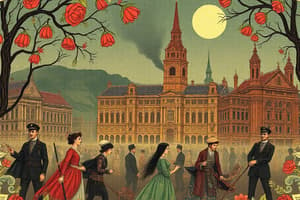Podcast
Questions and Answers
প্রথম বিশ্বযুদ্ধে কত সাল ধরে চলে?
প্রথম বিশ্বযুদ্ধে কত সাল ধরে চলে?
1914-1918
প্রথম বিশ্বযুদ্ধের মৌখিক নাম কী?
প্রথম বিশ্বযুদ্ধের মৌখিক নাম কী?
মহা যুদ্ধ
প্রথম বিশ্বযুদ্ধে যুদ্ধ কোথায় অনুষ্ঠিত হয়?
প্রথম বিশ্বযুদ্ধে যুদ্ধ কোথায় অনুষ্ঠিত হয়?
পশ্চিম ইউরোপ, মধ্যপ্রাচ্য, এবং উত্তর আফ্রিকা
প্রথম বিশ্বযুদ্ধের উৎপত্তির মূল কারণ কী?
প্রথম বিশ্বযুদ্ধের উৎপত্তির মূল কারণ কী?
প্রথম বিশ্বযুদ্ধের সমাপ্তির তারিখ কখন?
প্রথম বিশ্বযুদ্ধের সমাপ্তির তারিখ কখন?
প্রথম বিশ্বযুদ্ধে যুক্তরাষ্ট্রের ভূমিকা কী ছিল?
প্রথম বিশ্বযুদ্ধে যুক্তরাষ্ট্রের ভূমিকা কী ছিল?
বিশ্ব যুদ্ধ পরে যে দুইটি বিপক্ষকোণ্ড জন্ম দিল নতুন বিশ্ব ক্রমের সৃষ্টি করেছে?
বিশ্ব যুদ্ধ পরে যে দুইটি বিপক্ষকোণ্ড জন্ম দিল নতুন বিশ্ব ক্রমের সৃষ্টি করেছে?
বিশ্ব যুদ্ধে অত্যন্ত নামী ঘটনা কোনটি?
বিশ্ব যুদ্ধে অত্যন্ত নামী ঘটনা কোনটি?
বিশ্ব যুদ্ধের শেষে জাপানের যে কোনটি স্বীকৃতি দেওয়া হল?
বিশ্ব যুদ্ধের শেষে জাপানের যে কোনটি স্বীকৃতি দেওয়া হল?
বিশ্ব যুদ্ধের একটি অন্যতম গুরুত্বপূর্ণ ফ্রন্ট কোথায়?
বিশ্ব যুদ্ধের একটি অন্যতম গুরুত্বপূর্ণ ফ্রন্ট কোথায়?
বিশ্ব যুদ্ধে কোন দেশ অক্সিস পাওয়ারদের অংশীদারিতে ছিল?
বিশ্ব যুদ্ধে কোন দেশ অক্সিস পাওয়ারদের অংশীদারিতে ছিল?
বিশ্ব যুদ্ধের পরিণাম হিসেবে কোন দুটি শক্তি সুপাওয়ার হিসেবে উভয় উড়িয়ে উঠে?
বিশ্ব যুদ্ধের পরিণাম হিসেবে কোন দুটি শক্তি সুপাওয়ার হিসেবে উভয় উড়িয়ে উঠে?
Flashcards are hidden until you start studying
Study Notes
World Wars: A Brief Overview of Two Pivotal Conflicts
The World Wars, spanning from the early 20th century to the 1940s, are among the most significant events in human history. These conflicts, marked by their sheer scale, devastation, and far-reaching impact, have shaped our world in ways that continue to resonate today.
World War I (1914-1918)
The First World War, often referred to as the Great War, was a global conflict that involved nearly every major power of the time, including the Triple Entente (France, United Kingdom, and Russia) and the Triple Alliance (Germany, Austria-Hungary, and Italy). The war's origins lie in a complex web of alliances, imperial expansion, and nationalist aspirations, with the assassination of Archduke Franz Ferdinand of Austria-Hungary in Sarajevo on June 28, 1914, serving as the catalyst for the conflict.
The war was fought across vast landscapes, including Western Europe, the Middle East, and North Africa, and resulted in millions of casualties and profound political changes. The United States, which had initially remained neutral, entered the conflict in 1917, tipping the balance in favor of the Entente. The Treaty of Versailles, signed on June 28, 1919, formally ended the war, but its effects lingered for generations to come.
World War II (1939-1945)
The Second World War, a direct consequence of the failures of the Versailles Treaty and the rise of fascism, was an even more extensive conflict that involved far more nations than the First World War. The war's major participants included the Axis powers (Germany, Italy, and Japan) and the Allies (the United States, United Kingdom, Soviet Union, and China).
The war was fought across multiple theaters, with key battles taking place on the Eastern and Western Fronts of Europe, as well as in North Africa, the Pacific, and Southeast Asia. The war's most infamous event, the Holocaust, claimed the lives of over six million Jewish people and millions of other victims, a tragedy that continues to haunt the world today.
World War II's conclusion saw the emergence of a new bipolar world order, with the United States and the Soviet Union emerging as superpowers. The war's end was marked by the surrender of Germany and Japan in 1945 and the subsequent signing of peace treaties.
Legacy of the World Wars
The World Wars have had an indelible impact on the course of human history, shaping our world in numerous ways. These conflicts transformed the global balance of power, resulted in the birth of new nations, and fostered the development of new political ideologies. The wars also gave rise to some of the most significant human rights movements, including the fight for civil rights and the international effort to prevent the spread of violent conflict.
Moreover, the World Wars have left a profound and enduring legacy in the realm of technology and industry. The wars accelerated the development of numerous inventions, including radar, jet engines, and nuclear weapons, all of which have profoundly impacted our world.
In conclusion, the World Wars represent a pivotal moment in our shared history, one that continues to shape our world in ways both subtle and profound. By understanding the events and consequences of these conflicts, we can better appreciate the complex and interconnected nature of history and strive to create a more peaceful and just future for all.
Studying That Suits You
Use AI to generate personalized quizzes and flashcards to suit your learning preferences.




